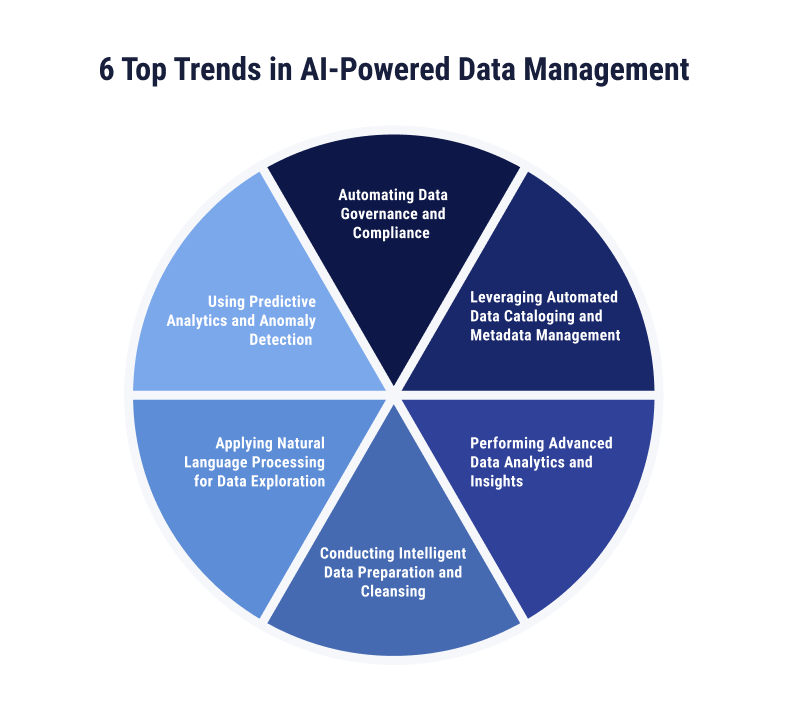
How can businesses derive value from growing mountains of data? Artificial intelligence can serve as the perfect counterpart to existing data management processes, boosting effectiveness and unlocking greater efficiencies and insights than were once available to businesses. We’ll talk about how data management has grown alongside AI, as well as the top current trends in AI and data management.
How Has Data Management Evolved with the Rise of AI?
As the amount of data we consume, create, and store has exploded, with global numbers estimated to reach 180 zettabytes by 2025, data management has become even more important, and artificial intelligence (AI) can help aid in its evolution in several ways:

- Automation: AI can automate tedious, manual tasks such as classification, data cleansing, and anomaly detection through machine learning algorithms. This can allow humans to focus on more strategic work.
- Data quality: Data coming in from different sources and in different formats can be streamlined and checked for accuracy by AI, ensuring higher data quality and reliability. This results in more accurate analyses and better decision-making.
- Security: Through anomaly detection, AI can help prevent security breaches and work to protect sensitive data.
- Integration: Instead of data existing in silos, AI can bridge the gap through automation and data quality measures, allowing for a more unified view of information that can be used for further data analysis.
- Analytics: AI can also do some heavy analytical lifting that can speed up the time it takes to reach important insights. Trends, forecasts, and patterns can be visualized and calculated more easily using artificial intelligence.
The Role and Benefits of AI in Data Management
AI can play an important role in effectively managing the growing volumes of information worldwide, both in the cloud and on-premises frameworks, providing a set of tools organizations can use to unlock value in their data.
With automation, businesses can enjoy streamlined processes and reduced time and effort on manual tasks. AI-powered data quality measures can help businesses make better-informed decisions. Real-time monitoring and threat identification can better safeguard data, and real-time insights can get organizations to their next product or service decision faster than ever. In many ways, artificial intelligence empowers companies by giving them a competitive edge and a head start toward pursuing innovative new projects.
6 Top Trends in AI-Powered Data Management
Instead of businesses reacting to new data challenges, AI can put them in a more proactive role. Emerging trends include organizations leveraging AI for data cataloging, advanced analytics, intelligent data preparation, keener predictions, and more.

1. Leveraging Automated Data Cataloging and Metadata Management
Data cataloging is when organizations create an inventory of all their data. Metadata can include information such as the location of the data, its type, a description of the data, where it came from (lineage), and the owner responsible for its maintenance.
Traditionally, data cataloging is a time-consuming and error-prone manual process. AI can automate this by tagging and classifying data assets, making it easier for users to find data, fix inconsistencies, and reduce errors.
2. Performing Advanced Data Analytics and Insights
Even with deep expertise and strong deductive powers, humans can miss subtle patterns in large datasets. Machine learning algorithms can be used to find hidden patterns or identify relationships more easily, especially in complex datasets. This can move businesses from simple to more sophisticated insights. AI can also create predictive models that allow for stronger trend forecasting.
3. Conducting Intelligent Data Preparation and Cleansing
Data preparation and cleansing are important in helping individuals accurately analyze and explore data. AI can automate tasks including finding and removing duplicate data, fixing inconsistencies in formatting, and filling in missing values. This creates better data that can be used to train AI models more accurately and reliably.
4. Applying Natural Language Processing for Data Exploration
Natural language processing (NLP) gives AI the ability to understand human language. When AI can understand natural language queries, it’s easier for humans to explore datasets in a more accessible and intuitive way. NLP can automate text summarization, find topics and themes in data, categorize named entities, and conduct sentiment analysis.
5. Using Predictive Analytics and Anomaly Detection
Sometimes we don’t see what’s coming down the road before it’s too late. AI can take historical data and use it to predict future trends or find anomalies in current data. This can assist businesses in anticipating issues before they become problematic, as well as make data-driven decisions to improve operational effectiveness.
6. Automating Data Governance and Compliance
Instead of reacting to breaches, AI-powered data governance and compliance measures can prevent issues before they occur. Data access control, audit logging, and lineage tracking can all be conducted with the help of AI tools. AI can also anonymize sensitive data, identify potential security risks from anomalous behavior, and automatically restrict access to data if suspicious activity is identified.
Unlocking the Power of AI in Data Management
Managing a vast amount of data can be challenging, but the right AI-enabled data management tools can simplify the complex. TierPoint’s AI advisory consulting services can help you better navigate and leverage your in-house data to unlock its true power and potential. Contact our advisory team today to start exploring how AI can transform your data management practices.
Learn how businesses like yours can use artificial intelligence and machine learning with our complimentary whitepaper. Download it today!

